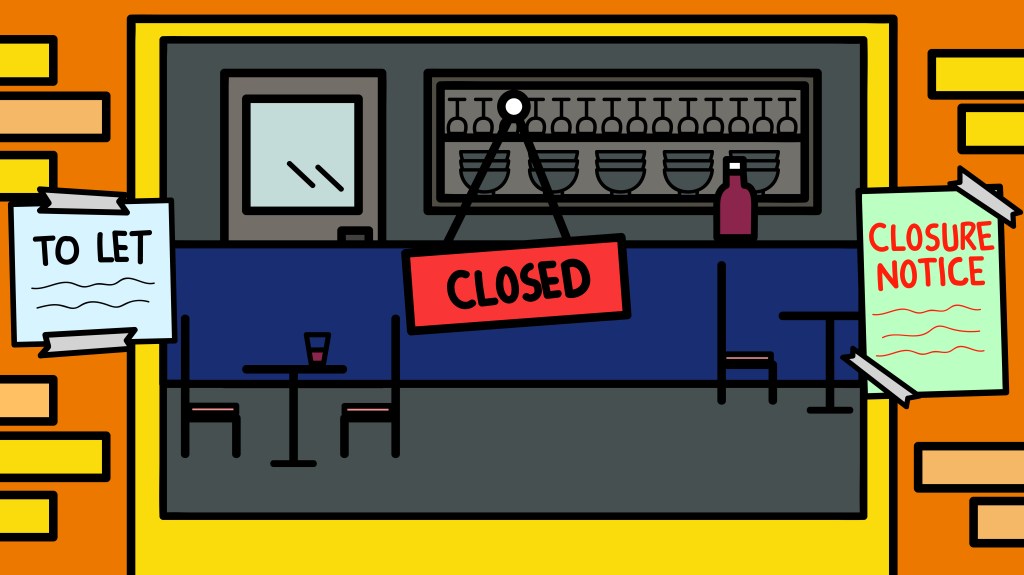Ordering a takeaway can be an ordeal. Do you want Chinese, your hungover brain coos, or do you want pizza? Or perhaps you want one of the 32 other options that the website has now alerted you to, each with its own 50 sub-options. Somehow, the simple desire to eat something encased in an oily, translucent cardboard box has now led you to question which kind of muhammara dip you want with your grilled halloumi and falafel wrap or whether the batata harra is superfluous.
Deliveroo’s virtual brand scheme, which was introduced 2017 and has recently been embraced by high street restaurants, makes everything a lot more complicated. The scheme enables restaurants to create online-only brands (“virtual restaurants,” if you will), with many of them selling the same dish, made in the same kitchen but under a different name. UberEats also boasts numerous virtual brands and JustEat was apparently eyeing up the idea in October.
Videos by VICE

Deliveroo, UberEats, and JustEat all argue that the virtual brand scheme gives restaurants the opportunity to test out different cuisines, use up spare kitchen space, and trial new dishes. None are secretive about the concept. Indeed Deliveroo holds up successful “VBs”—like smoked meat restaurant Texas Joe’s, which recently launched a Mexican side-hustle on the delivery app—as proof of its efficacy.
“Deliveroo is proud to have led the way in supporting virtual brands that have helped restaurants innovate; allowing chefs to bring customers exciting new menus that wouldn’t be possible without delivery,” a spokesperson for the company told me over email. “Virtual brands on Deliveroo have already made the transition to bricks-and mortar-restaurants thanks to the popularity of the new menus restaurants have been able to trial.”
So, what’s the problem? Well, while some restaurants are using the scheme to innovate, certain big-name chains are utilising their virtual brands to sell the same food. What this means in practice is that largely struggling high street restaurants, such as Bella Italia, Cafe Rouge, Las Iguanas (all part of the Casual Dining Group), and Frankie and Benny’s, are selling food on Deliveroo or UberEats, but under a different name. Order a croque monsieur from Stack and Grill on Deliveroo and you’ll receive one from Cafe Rouge’s menu, or pick something from Blazing Bird and it’s Las Iguanas who will be supplying it.
MUNCHIES ordered both Las Iguanas’ barbecue jerk wings and Peri-Peri wings, as well as Blazing Bird’s jerk barbecue wings and Peri-Peri wings, and found they were exactly the same, bar packaging. Many of Frankie and Benny’s’ burgers are available on Deliveroo, but under the BirdBox brand. Huh.

Technically, there’s nothing illegal about this—brands are able to sell products under a number of different trading names—but it does seem misleading, and calls into question whether the digitisation of food delivery has made it harder for consumers (read: hungry you, the morning after) to know what they’re ordering. It perhaps also comes as no surprise after Deliveroo was criticised for its “dark kitchens,” the practice by which food ostensibly made in a restaurant is actually prepared in a portable kitchen van in a nearby carpark. Deliveroo does technically disclose the connection between a restaurant and its virtual brand, but the information is only included in a small “terms and conditions”-style link at the bottom of the order page.
Inevitably, this can lead to some problems. In October last year, one disgruntled customer tweeted at UberEats: “I just ordered from Mac Shack and got delivered a meal from Bella Italia??? I am starving and fuming £26 pound down!! Please contact me ASAP.” You may already be aware you don’t like Frankie and Benny’s burgers, for example, but in a delirious, famished state, end up ordering from a place called “BirdBox,” unaware that you’re essentially getting the same thing, made in the same kitchen, from the same restaurant. Annoying.
It calls into question whether the digitisation of food delivery has made it harder for consumers (read: hungry you, the morning after) to know what they’re ordering.
MUNCHIES reached out to Casual Dining Group (who own most of the above restaurants) and Frankie and Benny’s to find out why they are using a scheme meant for innovation to sell regular food under a different brand name. We had not received a comment at the time of publishing.
At a time when 23,000 high street shops are reportedly set to close, and even decent food spots are struggling to stay open, it’s no wonder that these forgettable chains (is Las Iguanas just … Giraffe?) are trying to disguise their food with a name they think will appeal to “the youth.” Just like Frankie and Benny’s jumping on the Veganuary bandwagon, an exciting new brand name like “Burger Bros skrt skrt” or “Wing Shack” gives these almost-obsolete restaurants a chance to stay relevant. As one Twitter user puts it, “Faded casual dining chains are serving dishes from their menu via trendy alt accounts on Deliveroo? Like a high street restaurant interpretation of ‘How do you do, fellow kids?’”
But even this is quite an optimistic spin on the whole thing. At best, it’s a sad attempt to still be noticed, at worst, it’s purposely misleading customers. For the sake of your hungover self, maybe stick to your friendly local takeout in future.
That is, if they actually exist.




